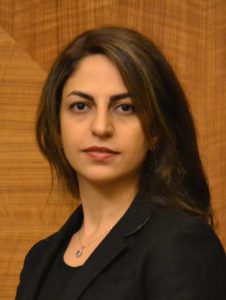Adapted from article by UW Graduate School
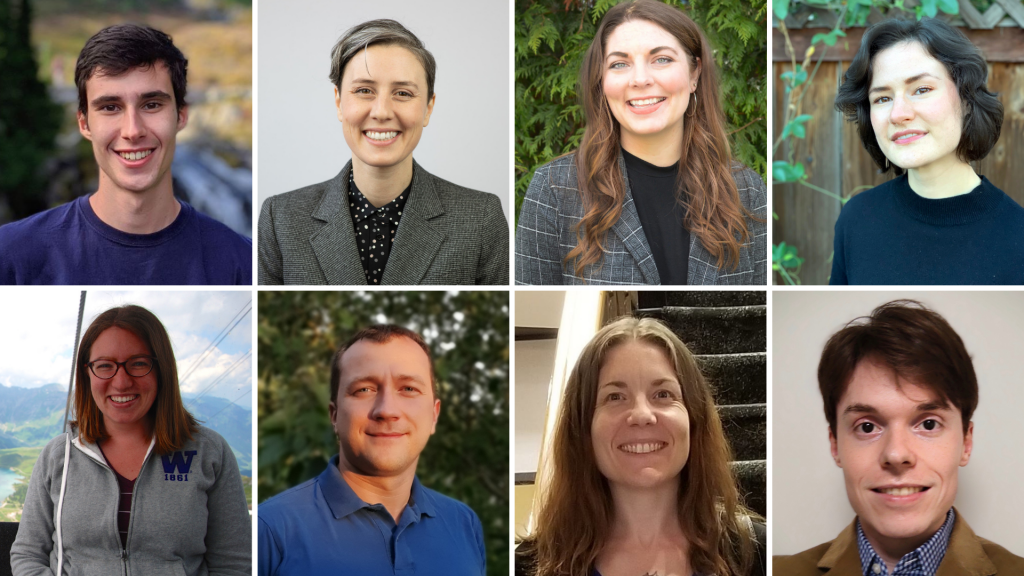
Eight UW graduate students received this year’s Distinguished Dissertation and Thesis Awards. Schwock (top left) won in the Thesis category of Mathematics, Physical Sciences & Engineering for his work on analyzing and predicting ocean ambient noise.
With research ranging from peace journalism in East Africa to structural racism in health care, eight recent graduate students were honored for their outstanding research in their doctoral and master’s studies.
The Graduate School’s Distinguished Dissertation and Thesis Awards recognize exceptional scholarship in four categories: biological sciences; humanities & fine arts; mathematics, physical sciences & engineering; and social sciences.
Professors who nominated these graduate students noted the advanced nature of their research, pragmatic and scholarly contributions to their field, and the students’ engagement with the academic community through service and mentoring. Awardees will each receive an honorarium of $1,000.
Felix Schwock, Electrical & Computer Engineering
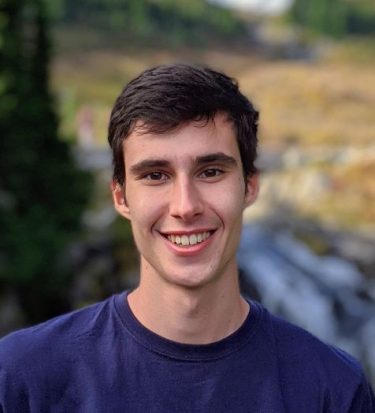
Felix Schwock
Thesis: “Statistical Analysis of Wind- and Rain-generated Ocean Ambient Noise in the Northeast Pacific Continental Margin”
Felix Schwock’s thesis unlocks some of the mysteries of the ocean by analyzing the ambient sounds of wind and rain.
Light can only penetrate the upper layers of the ocean, which means studying these dark waters has been a notoriously difficult task that requires creativity. That’s why researchers of the ocean often turn to sound to explore and understand this landscape. Sound, and in particular ambient noise, is a powerful tool for studying ocean processes as many contributors such as marine mammals, ships, rain or wind have their own unique acoustic characteristics.
Schwock, a Fulbright Scholar from Germany, used 3.5 years of acoustical and meteorological data recorded at the northeast Pacific continental margin to characterize the sound of wind and rain in the ocean. The research brings a recent perspective to the field, as most research in this area has used data collected in the 1950s and 1960s.
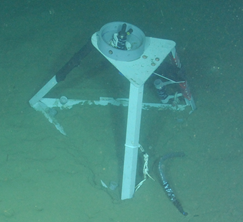
An underwater hydrophone used to detect and record sounds at the bottom of the ocean. Photo: Ocean Observatories Initiative (OOI)
The ocean environment has changed significantly since that time, however. Schwock therefore chose to use more recent long-term datasets recorded with large arrays of underwater hydrophones in the northeast Pacific continental margin between 2015 and 2021. This allowed him to perform a comprehensive study of wind- and rain-generated ambient ocean sound using modern signal processing techniques that increases data analysis efficiency while retaining a high degree of accuracy.
The results of Schwock’s analysis can serve as a baseline for measuring and estimating wind speed and rain rates over the open ocean, which is important for studying the earth’s climate system. Schwock’s analysis has the potential to contribute to more accurate meteorological forecasts and can also help as a reference for future ambient noise and underwater communication research.
“I feel very honored to be a recipient of this award,” said Schwock. “I am grateful for all the support I received along the way from numerous people, most notably professor Shima Abadi, who dedicated so much of her time to provide feedback and guidance during the research and writing process.”
Abadi, an adjunct assistant professor at UW ECE whose work includes developing signal processing algorithms for analyzing data collected by large, dynamic, and irregular underwater networks, discussed the impact of Schwock’s research:
“Felix performed a comprehensive study of wind- and rain- generated sound in the ocean. What Felix found in his thesis provides a solid foundation for ocean noise prediction. He showed that the ocean ambient noise is strongly site-dependent and found the optimum frequency for ocean noise prediction. He also discovered that underwater noise during rain strongly depends on wind speed, which was not well addressed in literature before.”
“In addition to his strong publication record,” continued Abadi, “Felix made a significant contribution to his research community by developing a free Python package that helps researchers have easy access to this rich dataset (which had remained unused for several years due to data accessibility issues), perform spectral analysis, and visualize results.”
“This award really encourages me to continue working on fascinating research projects and to make my contribution to the scientific community.” – Felix Schwock
An article co-written by Schwock and Abadi on the topic, “Characterizing underwater noise during rain at the northeast Pacific continental margin” was recently featured as the cover image of the June 2021 edition of the Journal of the Acoustical Society of America (JASA).
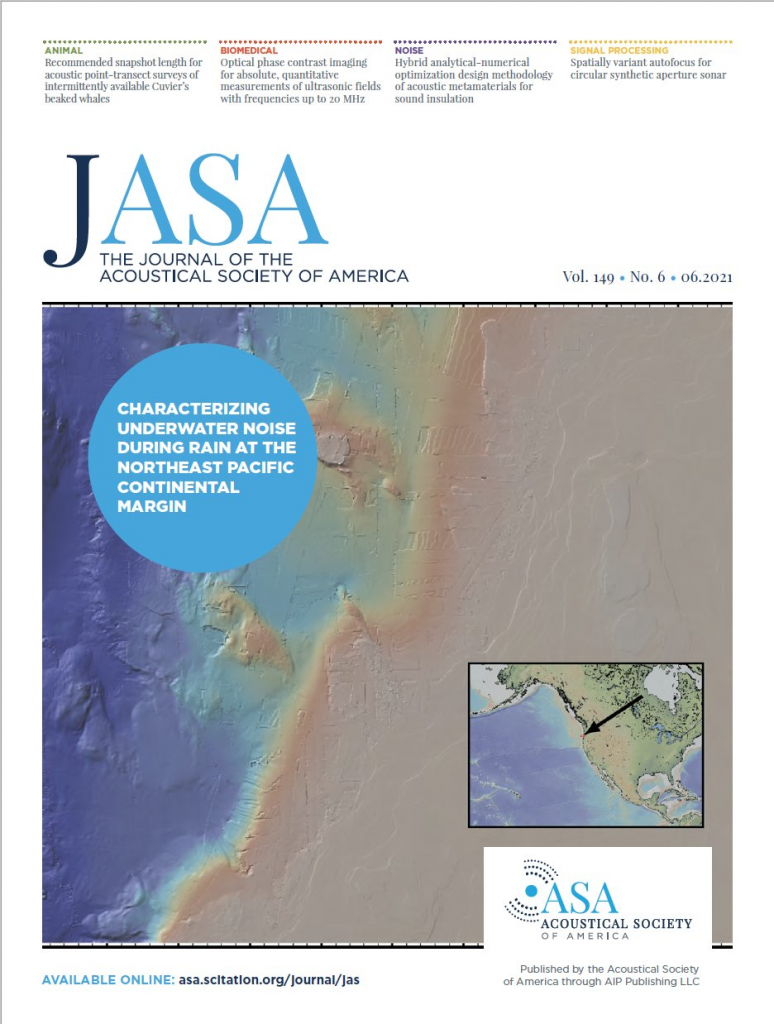
The Journal of the Acoustical Society of America, Vol. 149, June 2021
The last UW EE graduate student to be awarded the UW Graduate School’s Distinguished Thesis Award was Charles “Pascal” Clark in 2008 — the award’s inaugural year. Advised by ECE Professor Les Atlas, a leader in signal processing research, Clark went on to be recruited by Apple, where he is currently a key contributor to their audio research.
Atlas said of Schwock, “Felix would make an excellent faculty candidate after completing his PhD. As faculty positions are very competitive, applicants need to stand out as having special qualities. This award will definitely help Felix get noticed if and when he decides to apply for such a position.”
When coming to the UW, Schwock said that his initial goal was to find an interesting research project and to spend a large part of his master’s degree working on that project.
“At that time, I couldn’t have imagined how great this was eventually going to work out,” said Schwock. “This award really encourages me to continue working on fascinating research projects and to make my contribution to the scientific community.”
For the remainder of his doctoral studies, Schwock plans to work on Graph Signal Processing (GSP) and machine learning projects with professors Atlas and Abadi, focusing on theoretical work in the field of signal processing. His PhD research assistantship is currently supported by an Office of Naval Research (ONR) project titled, “Large Array Beamforming using Graph Signal Processing,” which is being run by Atlas.
Listen to a selection of Schwock’s recorded audio samples of wind and rain below. Note that rain noise has a higher pitch than wind noise. This is caused by small raindrops which generate oscillating air bubbles in the water that oscillate at a frequency of around 15kHz. In the first example, the periodic pinging sounds are Acoustic Doppler Current Profiler (ADCP) pings, which are removed during post-processing.
Congratulations to Schwock and all of these incredible graduate students for their achievements!
Ryan Hoover | UW ECE News


